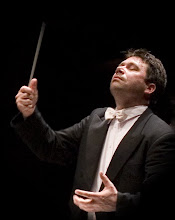How Bruckner chased us through Europe, finale...
As a kid I had just enough pocket money to buy a return train ticket to Amsterdam. I would explain the guards from the Concertgebouw I used all my money to get there and after a while I didn’t even have to explain the story anymore. They would always let me in, to rehearsals as well as to concerts. My parents would call this ‘Arthur’s complementary concert face’. There was no reason for me to doubt whether I could enter the tonight’s concert or not. Back at the stage door I ask the guard whether I can come in to hear the second half of the concert. He stares to me in disbelief, did he hear it right? Because of the chic Vienna I forgot for a moment I look homeless. My thoughts go quickly, there is no time to lose. I explain to him what has happened, how I’ve just got my hands on the score of the same symphony the orchestra will perform here tonight and how I have to conduct the same symphony after the weekend in Romania. I even throw in some musical terminology and show my new score to convince the stubborn looking man. He doesn‘t bat an eyelid. ”Haben Sie ein zutritt Karte?” Whether I have a ticket. “No sir, but I will be happy to buy one.” I’m reaching for my wallet. “Impossible, the box office is closed”. “Sir”, I reply in a stricter voice, “Of course it is possible. Sir, look at me, see, these are legs, that, I point to the left, is a hallway. A right turn, up the stairs and there is the concert hall.” I had been in the building before and knew exactly where to go. “Sir, it is possible. ‘Impossible’ doesn’t exist!” That seems to help. He calls his boss, not using one more motion than necessary. The second man arrives right away and listens patiently to my rushed story. The second half is about to start. Without twitching he tells me in a friendly Viennese manner that it is not possible to enter the concert without a ticket, and he even takes the time to tell me that the box office is closed, not to be opened anymore tonight. I decide to bring out the heavy artillery. “When Kurt Masur hears you didn’t let me in you will be in trouble.” I held my breath. Apparently there exists an even higher boss. Within a minute everything is arranged and the boss of all bosses personally walks me to the grand hall. Half a minute before the famous maestro treads onto the stage I sit down and open the fresh score to hear an unequalled Bruckner. One hour passes without experiencing time. Totally inspired by what I have heard I decide to find the eighty-one year old chief after the concert. With great attention and visible amusement he listens to how I happened to be here to listen to his Bruckner and how it has inspired me for my own Bruckner interpretation next week. Masur told me he conducted the same orchestra in Romania as a young man. A whole month of score studying couldn’t have given me more insight than hearing this amazing concert. What an example in sound, warmth, space, breath and balance. I hear myself sing the second theme of the second movement, Andante quasi Allegretto, the solo line of the viola’s, when walking back to the hotel through the serene night.
Two rehearsals are now behind me in Targu Mures, Romania. The orchestra sounds better than ever. I don’t give up before I achieve the sound I want from them. That’s worth a Volkswagen Passat. Yes, even one with heated, leather seats and an open roof with solar cells to cool the car when parked in the sun. Okay, it was well insured.
~
